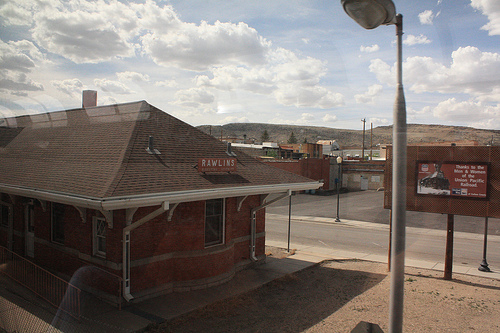By KURT CASWELL

After the wind, a man named Chuck died lying on the ice next to the fuel pump at the Phillips 66 off I-80 on the east side of Rawlins, Wyoming. I helped his friend lift him down from the passenger seat of the pickup, a big man, heavy and round, dressed in heavy Carhart work clothes against the cold. I gentled his head against my chest, holding him under the arms, a rag doll pulled down in the middle, my cheek so close to his, his little moustache, his hairy ears, his jowly neck. He was already dead, no pulse, no breath, his eyes gone out, but the 911 operator asked us to begin chest compressions.
“I know CPR,” his buddy said, and started in.
I stood in the open doorway of the pickup talking to the operator as she gave instructions. She wanted me to count with her, aloud so she could hear me, each compression one number on a four-count cycle. As I counted, more men arrived, big men, tough men, dressed as Chuck was dressed, all on their way to work, probably to the oil fields or out to the refinery at Sinclair.
Traveling through for the holidays from Texas to Idaho, I had been pinned down by the wind in middle Wyoming, part of that storm that swept most of America, the roads closing behind me and then ahead of me, opening again, closing once more. Wind gusting at 65 mph, driving the temperature to 20 below, kicking up so much snow you couldn’t see the blue sky through the white chaos. A shearing wind, a cutting wind, a vise.
“I grew up here,” the woman at the front desk of the roadside motel told me, “and I don’t travel on days like this. I’ve seen this wind tear those empty transport trailers in half. You’re better to wait it out.”
After two days, the wind dropped, the roads opened, and the sun was going to shine. Temperatures would soar to 27 degrees Fahrenheit by afternoon. At first light, on my way at last, I stopped to fuel up. That’s when Chuck’s buddy asked me for help.
I kept on with the count, and Chuck’s buddy kept on with the compressions until he looked up at me and shook his head. “Come on, Chuck,” he said.
The men gathering wanted to help too. Someone put his felt-lined coat beneath Chuck’s head, another put his hand on Chuck’s shoulder, a gesture in comfort, I think, for all of us. They held their faces grave, since Chuck was one of them, bucking the cold, wide empty of Wyoming for a dollar to keep a family going, or to start one.
“I know you’re getting tired,” the operator said. “Help is coming.”
“I’ll take over,” a young man said to me, his head bare in that bitter cold. He started in on my count, then leaned to press his lips against Chuck’s to give him air. When he wore out, another man took over, white-haired with a white mustache. He pressed into Chuck’s chest with his big hands, steadily and forcefully, nodding to me at my count, his sad eyes grieving already, a look that said: if you’re going to do it, you had better do it now, because you just never know.
The paramedics arrived, cut Chuck’s shirt open to expose him to the freezing air, the white-haired man continuing with his compressions. I told the operator.
“If you need us, we are always here to help,” she said.
The colored lights flashed as they raised Chuck up and pushed him into the ambulance.
Chuck’s buddy thanked me, and I told him I was sorry as the emergency vehicles pulled away. Then he did too, following the ambulance, waving to me as he went. There was nothing left to do. We, the men who had gathered to help, were left to our own affairs. I pumped fuel into my truck and drove west, the sun rising behind me.
Miles later, in Montpelier, Idaho, I found a five dollar bill in the snow-covered parking lot at a grocery.
Kurt Caswell is the author or two books of nonfiction: In the Sun’s House: My Year Teaching on the Navajo Reservation (Trinity University Press, 2009), and An Inside Passage (University of Nebraska Press, 2009) for which he won the River Teeth Literary Nonfiction Book Prize.




